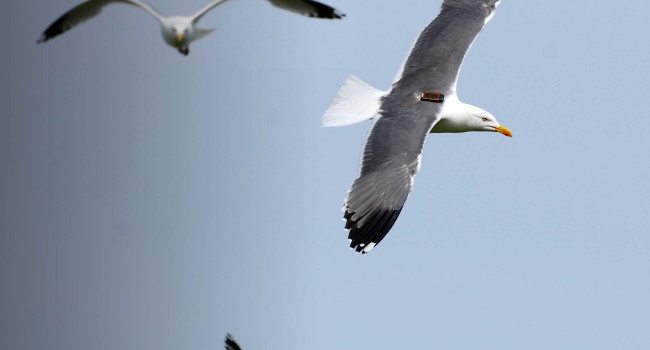Research areas
Our research focuses on Scottish habitats, species and policy-relevant issues, delivered within BTO's UK-wide research framework. Our principal work areas are uplands and moorlands, woodlands and forestry, seabirds and marine renewables, waders, raptors and policy-driven projects. We also have an interest in waterways birds, urban biodiversity and machair.
Our staff are sometimes seconded to BTO Consulting for commercial projects.
Uplands and moorlands
‘Upland’ habitats cover around 50% of Scotland, and most areas have been substantially altered by humans over time, for example by deforestation, reafforestation, grazing, drainage, or burning (read more about the history of change in the uplands). Debate over land use in the uplands continues to this day. Our research is determining how grassland, moorland, blanket bog and forest-edge management affects bird populations. We have particular interests in a number of species of the uplands and its margins including breeding waders, Whinchats, Short-eared Owls and Ptarmigan. We are also interested refining upland and moorland survey methods to enhance monitoring coverage. Contact John Calladine.

Woodlands and forestry
Around 6,000 years ago, forests probably covered most of Scotland but in 2006 only 17% of the land was forested. The Scottish Forestry Strategy sets an ambitious target to increase cover back to 25%, with an increasing proportion of native species. We aim to provide an evidence-base that can inform predictions about how changes in forest cover, the spatial distribution of woodland, and forest management will impact on bird populations. Previous work has investigated how commercial management practices such as thinning affect bird populations, as well as exploring opportunities afforded by woodland-edge management, native woodland and scrub expansion, short rotation forestry and sylvicultural systems. Contact John Calladine.
Seabirds and marine renewables
Scotland supports a significant proportion of the UK's globally important breeding seabirds. Our Scottish office hosts staff from BTO’s Wetland and Marine team who aim to understand and find solutions to the growing pressures which threaten their populations. Such pressures include over-fishing, climate change, renewables, pollution and bycatch. The challengs faced by seabirds have resulted in the development of Conservation Strategies, first in Scotland and now in England, into which BTO has provided input. As a partner in the Seabird Monitoring Programme we are also working to improve and integrate population monitoring of our seabird species, including via citizen science approaches. Through the Re-trapping Adults for Survival scheme and studies at key sites, survival rates can be estimated which provide clues about what may be driving changes. Marine renewables are a significant focus, with a programme of work encompassing tracking to understand interactions with existing and proposed wind farms, guidance on the approaches and metrics used to assess impact risk, and analysis to determine population level effects. Contact Liz Humphreys.
Waders
Breeding waders are in steep decline, and are now a high conservation priority, facing a variety of different threats, including changes in farming, tree-planting on open habitats, and increased impacts of predation. Scotland is particularly important for breeding waders, and we are working to provide policy-makers and managers with the information they need to factor waders into their decision-making. We have been working with other members of the collaborative Working for Waders initiative, as well as with other partners that include National Park Authorities, private estates and the forest industry. Through this work we have drawn together guidance for wader-related fieldwork, trialled survey methods tailored to important groups of stakeholders such as farmers and gamekeepers, developed maps aimed at improving strategic decision-making for waders, and gathered information on local wader projects in Scotland and further afield. Our Wader Project Officer, Paul Noyes, liaises closely with a wide range of stakeholders to support local wader conservation and monitoring work, and foster cross-sectoral collaboration for waders. Previously, we have also studied factors affecting the breeding waders of Hebridean machair. Contact Mark Wilson.

Raptors
In a UK context, Scotland is a stronghold for many birds of prey, including the iconic Golden Eagle, Peregrine, Merlin and Short-eared Owl, plus two reintroduced species, the White-tailed Eagle and Red Kite. Many species are in recovery, following widespread persecution and negative effects of pesticides, though Kestrel and Peregrine are declining in at least some areas. Illegal killing and disturbance is still widespread, and a range of environmental and man-induced threats exists. We are one of seven partners in the Scottish Raptor Monitoring Scheme, we host the Scottish Raptor Monitoring Co-ordinator, and we provide advice and expertise on the curation of raptor information, data analysis, reporting and raptor trends and indicators. We were involved in a review of the impacts of predatory birds for Scotland’s Moorland Forum. We continue to play a leading role in co-ordinating national Peregrine surveys every ten years, most recently in 2014. Contact Mark Wilson.
Policy-driven projects
Our robust stance, reputation for high quality research, and our understanding of the Scottish context mean that we are well-placed to carry out policy-driven projects for, and provide advice to, diverse stakeholders. We have experience of a wide range of Scottish habitats, species and applied conservation issues, scientific critique and reviewing, and in projects that involve active stakeholder engagement and co-production of research. We can draw effectively on the collective expertise of colleagues across the organisation.
Previous policy-driven work includes a review of the population status of Northern Raven in Scotland, an assessment of the impacts of goose scaring on Islay, a review of goose management policy in Scotland, advice on the ecology and management of urban gulls in Scotland, a major review of the impacts of predatory birds on wildlife, a literature review of the evidence base for inclusion of bird species listed on General Licences in Scotland and a review of literature on the qualifying interest species of Special Protection Areas (SPAs) in the Firth of Forth and development-related influences. We can also offer a range of ecological consultancy services, subject to staff availability. Contact Chris Wernham.








Share this page